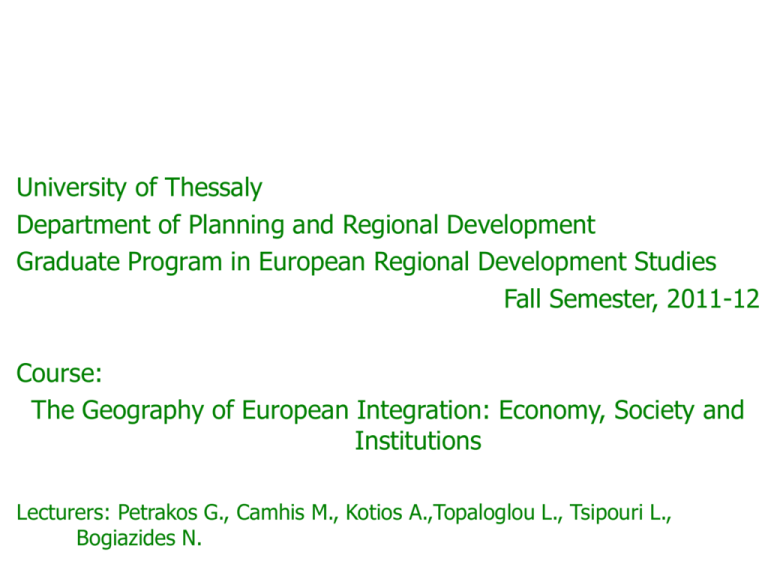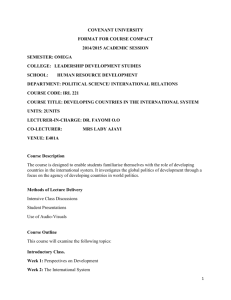Presentation 5 Wherefore Europe N Bogiazides 2011 - e
advertisement

University of Thessaly Department of Planning and Regional Development Graduate Program in European Regional Development Studies Fall Semester, 2011-12 Course: The Geography of European Integration: Economy, Society and Institutions Lecturers: Petrakos G., Camhis M., Kotios A.,Topaloglou L., Tsipouri L., Bogiazides N. Presentation 5: Wherefore Europe Nick Bogiazides European Politics Grand politico-ideological movements in postwar Europe East-West divide Between divergence and convergence the anti-colonial movement the role of the market the UN disarmament and the Helsinki process European Politics In the East Soviet model and its discontents (4 major rebellions against it Yugoslavia-style federalism Romania-style dictatorship Hungary and Czechoslovakia-style market entryism European Politics In the West, until 1980 Centre-right Keynesianism – (saving private capital) Social-democratic Keynesianism – establishing and expanding the welfare state European Politics In the West, until 1980 On the left Eurocommunism Old style stalinism Trotskyism Maoism (May ’68, anti-colonial movement, anti-Vietnam war movement) European Politics In the West, post 1980 Thatcherite liberalism ‘rolling back the frontiers of the state’ at an ideological, yet not practical, level Partial dismantling of the welfare state Weakening of the trade union movement Americanisation of European politics Whither Europe? Wither the nation state? Whither Europe? Wither the nation state? The double transfer of sovereignty, up to the European Union (federal, supranational level), down to the regions (local, sub-national level) The nation state, a 19th century invention, both too small and too big for the 21st century Whither Europe? Wither the nation state? Two interpretative paradigms: Stanley Hoffman, The European Sisyphus: Essays on Europe (1964-1994), Westview Press (1995), and The New European Community: Decisionmaking and Institutional Change (co-edited with R. O. Keohane), Westview Press (1991) Whither Europe? Wither the nation state? Two interpretative paradigms: Stanley Hoffman, The European Sisyphus: Essays on Europe (1964-1994), Westview Press (1995), and The New European Community: Decisionmaking and Institutional Change (co-edited with R. O. Keohane), Westview Press (1991) [functionalist approach] Whither Europe? Wither the nation state? Growth, rather than weakening, of nation-state bureaucracies, broadening of state intervention in a variety of new fields. Extension of supervisory and control mechanisms at national level If only, in order to defend and promote effectively national interest in the labyrinthine maze of EU bureaucracy Whither Europe? Wither the nation state? Yet, though inflated, such nation-state government constructs are relegated to the level of administrative machine Shift from government to administration autorité de prince to autorité de gestion Regierung to Verwaltung Whither Europe? Wither the nation state? Second interpretative paradigm: Cynthia Cockburn The Local State: Management of Cities and People, Pluto Press (1977) Whither Europe? Wither the nation state? Second interpretative paradigm: Cynthia Cockburn The Local State: Management of Cities and People, Pluto Press (1977) [structuralist approach] Whither Europe? Wither the nation state? The central state is responsible [assumes primary responsibility] for guaranteeing the conditions of the reproduction of capital and productive processes, while The local state is responsible [assumes primary responsibility] for guaranteeing the conditions of the reproduction of labour and consumption processes European Politics Wherefore European Politics Institutional convergence or divergence? A federation without a nation? Is a citizens' Europe feasible or will state building yet again subsume human emancipation into a new national state construct, with a raison d' etat diverging or opposing an illusive etat de raison?








